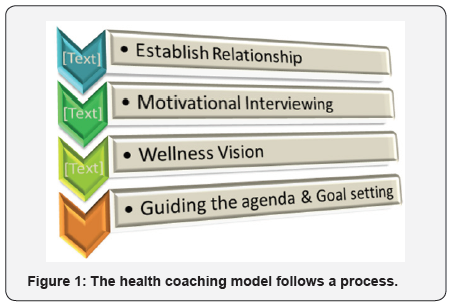Oral Health Coaching - The Emerging Role of Dental Professionals- Juniper Publishers
Juniper Publishers- Open Access Journal of Dentistry & Oral Health
The old curative approach to patient care will no longer work in today’s changing world because the dental healthcare landscape has completely evolved. Dental health care professionals are much more than highly skilled clinicians schooled in art and science of diagnosing and treating oral health conditions. The pursuit of clinical excellence is an honorable virtue. But what about expanding our ability to collaborate with patients who are rapidly evolving as healthcare consumers as well? The primary duty of the oral health is to take the time to see beyond the mouth to understand and guide patients in self-discovery so that they are able to come to comfortable conclusions in their own mind and be more committed to those choices.
Keywords: Oral Health; Health coaching; Health promotion; Behavior change; Dental professionals
Introduction
Health Coaching (HC) is based on evidence-based clinical interventions, motivational interviewing to facilitate and initiate a behavior change, definite goal setting, active and engaging listening, aggregation and trending of health outcome measurement, and wellness and prevention. HC helps to creates awareness about individual values and empowers people to make a definitive transition towards a healthy lifestyle [1-4] (Figure 1).

Review of literature regarding health coaching has shown it to be effective in improving various aspects of health. A study conducted on type 2 Diabetic patients concludes that after six months, individuals who were coached showed a great improvement in medication adherence. Various studies conducted on impact of Health Coaching reflected that it had a positive impact on patients’ knowledge, skill, self-efficacy and behavior change while a non-coached control group did not show any improvement. Another study carried on tobacco cessation concluded that after 12 months, the participants that underwent coaching had a 32% quit rate as compared to 18% for nonparticipants. This is considered a positive outcome, because other studies have shown that when individuals reduced their tobacco usage, they find increased motivation to quit entirely in the future [5-7].
Dental professionals undergo extensive education and training during their course to learn “what is best” for their patients. However, traditional delivery of education and training can miss “how” to achieve that best. “How” is implied in a person’s motivation and specific motivators need to be identified with support and encouragement of healthcare providers. Health Coaching may be used as an effective common health promotion approach for better management of oral health [8-10].
Oral health is managed based on objective measures such as the presence and severity of dental disease. In recent years, oral health researchers and practitioners have shown increasing interest in a widened array of physical, psychological, and social factors found to influence patients’ oral health. Alternatively, health care professionals and other health care workers could be trained to effectively deliver oral health care based on prevention through training that helps them to work with their patients with emphasis on
- The first step is assessment of the patient’s clinical and psychosocial risk towards predisposition for current and future oral disease;
- Next step is to explore and confirm specific patient behaviors
- Followed by ranking of these specific behaviors in terms of their contribution to poor oral health outcomes and assess a person’s motivation to alter their behavior;
- Last but not the least an effective communication of physical oral disease findings and explanation to patients how altering specific concrete behaviors could result in better oral health (and possibly systemic health). Coaching the patient in such a way that they are motivated and actively involved to act on plans to initiate and maintain behaviors that promote optimal oral health [11-13].
Encouraging oral health behavior change is a non-linear, multilayered, dynamic process. This integrative process can be used as a template to advance a greater focus. By reminding ourselves that dentistry is a helping profession, we will see more value in “oral health coaching” as a desired and supportive means to an end. We are helping people to make decisions that can add to the quality of their lives. By altering your thinking and approach slightly you can easily shift the focus from “us” and our procedures to “the patient” and the quality of life impact our services can have on their lives. This shift in thinking will enable us to communicate with our patients in a more mentorship based, collaborative and inspiring way regarding prevention and health promotion in dentistry [14].
Modern dentistry is bright and filled with opportunity when we choose to expand our clinical excellence while concurrently taking the time to grow as “oral health coaches”. “Oral health coaching” is the emerging yardstick that will differentiate us to become more effective as clinicians while feeling more trusted and valued in the eyes of your patients.
For more Open Access Journals in Juniper Publishers please click on: https://juniperpublishers.com/aboutus.php
For more articles in Open Access Journal of Dentistry & Oral Health please click on:
To know more about Open Access Journals please click on: https://juniperpublishers.com/journals.php


Comments
Post a Comment